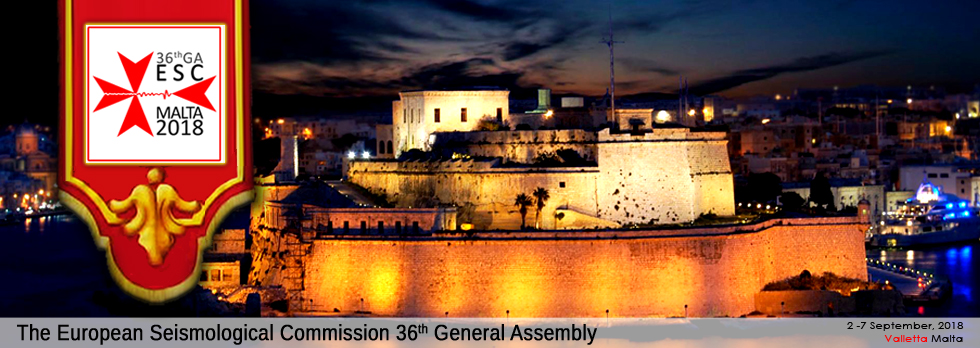The Department of Geosciences of the University of Malta is pleased to invite seismologists, geologists and engineers to the 36th General Assembly of the European Seismological Commission (GA ESC) that will be held from the 2nd to the 7th September 2018 in Valletta, Malta.
The Assembly is primarily a meeting ground for academics and researchers working in the field of seismology and related applications, including applied and social aspects of seismology, such as earthquake hazard and risk, earthquake engineering, education and awareness, and risk prevention.
In particular, the convenors of session n.41 are pleased to invite You to submit an abstract.
More info at: http://www.escmalta2018.eu/page/home
S41 Earthquake risk perception, communication and mitigation strategies
Conveners:
Elena Dell'Agnese, University of Milano-Bicocca, Italy, elena.dellagnese@gmail.com
Francesco De Pascale, University of Calabria, Italy, fr.depascale@gmail.com
Piero Farabollini, University of Camerino, piero.farabollini@unicam.it
Francesca Romana Lugeri, ISPRA/University of Camerino, francesca.lugeri@unicam.it
Fausto Marincioni, Marche Polytechnic University, Italy; Long Island University, U.S.A., fausto.marincioni@gmail.com
Francesco Muto, University of Calabria, Italy; francesco.muto@unical.it
Risk and disasters are social constructs deriving from an unsustainable human-environment interaction. Earthquake hazard do not created damages and destruction; it is our vulnerability and exposure to such processes that creates the conditions of risk. There is nothing natural about an earthquake disaster, yet the common perception is that humans are victims of nature's extreme events. Moreover, the ability of a society to respond to earthquakes does not depend primarily on the emergency conditions created by the impact, but rather on the pre-disaster settings and circumstances.
From the agricultural revolution onwards, humans have tried to free themselves from the control of nature by modeling the territory for his own benefit. This, on the one hand, has enabled the social development we enjoy today, yet, on the other, the interaction with natural processes we do not fully understand has created problems of exposure and vulnerability. The consequences went beyond the creation of risk conditions and caused profound changes in environmental cycles contributing to the current geographies of the Anthropocene.
Recent earthquakes, including those in Italy and Iran, have unequivocally shown the dominant role of societal vulnerability in creating those disasters. The Mediterranean region, unceasingly affected by strong earthquakes and almost all type of known natural hazards, is very representative of these complex and multi-scale dynamics.
From an examination of the dramatic events that have recently occurred in the central region of Italy, there emerges the need to provide the general public with correct and clear information on the complex scenario characterising this as well as another- country. Experience teaches us that tackling the subject of the prevention of risk and protection from danger (the avoidance of exposure) is very difficult. What is needed is a communicative strategy that informs the public of the characteristics of a territory (understood as a natural and cultural environment) and the relative operative dynamics, just as one should understand the anatomy and physiology of one's own body in order to manage and protect it in the best possible way.The proposers encourage abstracts discussing the multiple dimensions of earthquake risk reduction, including, but not limiting to, the following research lines:
Risk communication and social perception;
Prevention and population preparedness;
Community based approach;
Adaptive capacity;
Representation of earthquakes in popular culture;
New technologies for investigations of hazards and risk;
Vulnerability reduction;
Disaster governance.
The conveners are considering the publication of a special volume in the book series "Geographies of the Anthropocene" (Il Sileno).
Best regards
Prof. Piero Farabollini

